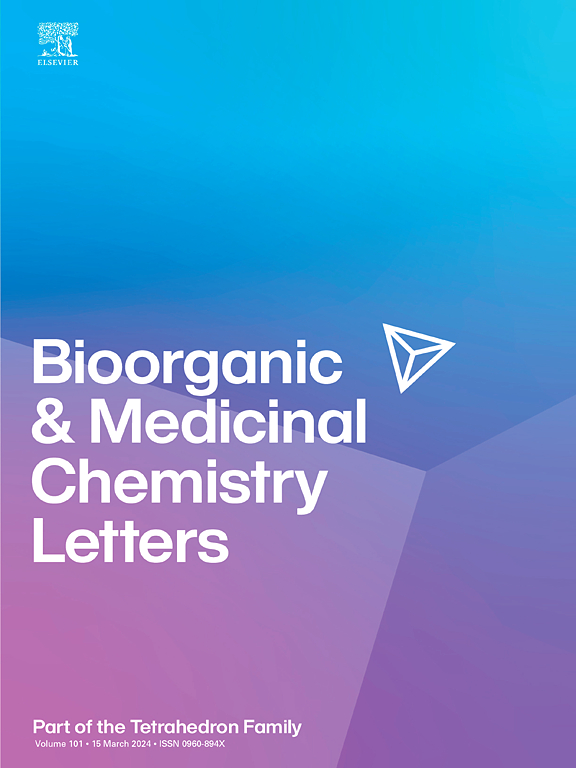The novel Piperine derivative YL-1-9 exhibits anti-breast Cancer effects by inducing apoptosis via the p53/p21 pathway
IF 2.2
4区 医学
Q3 CHEMISTRY, MEDICINAL
引用次数: 0
Abstract
The tumor suppressor protein p53 plays a crucial role in the pathogenesis of breast cancer; however, its function is often compromised due to MDM2 overexpression or mutations in the p53 gene, which occurs in approximately 30–35 % of breast cancer cases. Piperine, a natural bioactive compound, has shown potential in inhibiting breast cancer cell growth by upregulating p53 expression. However, its clinical application is hindered by poor bioavailability, potential toxicity, and the risk of undesirable drug interactions. In the present study, a novel derivative of Piperine, YL-1-9, was synthesized and evaluated for its anticancer activity against breast cancer. YL-1-9, a bicyclic amide derivative of Piperine, was evaluated for antitumor effects both in vitro and in vivo using MTT assays and the chick embryo chorioallantoic membrane (CAM) model. Further investigations into its effects on breast cancer cell clonogenicity, adhesion, invasion, and migration were conducted through colony formation assays, EdU assays, cell adhesion and invasion studies, and wound healing experiments. Western blot analysis was performed to elucidate the effects of YL-1-9 on the cell cycle and apoptosis, which were further validated using YO-PRO-1 and propidium iodide dual staining. YL-1-9 significantly inhibited breast cancer cell proliferation, adhesion, invasion, and migration, while inducing cell cycle arrest and promoting apoptosis. Mechanistically, YL-1-9 downregulated critical proteins in the CDK4/6-cyclin D-Rb-E2F pathway and the Caspase 3/Bax/Bcl-2 apoptosis signaling pathway. These findings position YL-1-9 as a promising candidate for breast cancer therapy; however, further clinical studies are necessary to fully assess its therapeutic potential.

新型胡椒碱衍生物 YL-1-9 通过 p53/p21 通路诱导细胞凋亡,具有抗乳腺癌作用
肿瘤抑制蛋白p53在乳腺癌的发病过程中起着至关重要的作用;然而,由于MDM2过表达或p53基因突变,它的功能经常受到损害,这种情况发生在大约30 - 35%的乳腺癌病例中。胡椒碱是一种天然的生物活性化合物,已显示出通过上调p53表达抑制乳腺癌细胞生长的潜力。然而,其临床应用受到生物利用度差、潜在毒性和不良药物相互作用风险的阻碍。本研究合成了一种新的胡椒碱衍生物YL-1-9,并对其抗乳腺癌活性进行了评价。利用MTT法和鸡胚绒毛膜-尿囊膜(CAM)模型,研究了胡椒碱双环酰胺衍生物YL-1-9在体外和体内的抗肿瘤作用。通过菌落形成实验、EdU实验、细胞粘附和侵袭研究以及伤口愈合实验,进一步研究其对乳腺癌细胞克隆原性、粘附、侵袭和迁移的影响。Western blot分析YL-1-9对细胞周期和凋亡的影响,并通过YO-PRO-1和碘化丙啶双染色进一步验证。YL-1-9显著抑制乳腺癌细胞的增殖、粘附、侵袭和迁移,诱导细胞周期阻滞,促进细胞凋亡。在机制上,YL-1-9下调了CDK4/6-cyclin D-Rb-E2F通路和Caspase 3/Bax/Bcl-2凋亡信号通路中的关键蛋白。这些发现表明YL-1-9有望成为乳腺癌治疗的候选药物;然而,需要进一步的临床研究来充分评估其治疗潜力。
本文章由计算机程序翻译,如有差异,请以英文原文为准。
求助全文
约1分钟内获得全文
求助全文
来源期刊
CiteScore
5.70
自引率
3.70%
发文量
463
审稿时长
27 days
期刊介绍:
Bioorganic & Medicinal Chemistry Letters presents preliminary experimental or theoretical research results of outstanding significance and timeliness on all aspects of science at the interface of chemistry and biology and on major advances in drug design and development. The journal publishes articles in the form of communications reporting experimental or theoretical results of special interest, and strives to provide maximum dissemination to a large, international audience.

 求助内容:
求助内容: 应助结果提醒方式:
应助结果提醒方式:


